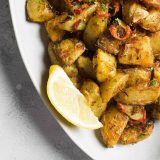Tradition may inform much of Sami Tamimi’s cooking, but it doesn’t constrain it. Take his shakshuka, traditionally a simple skillet of eggs poached in peppers and onions. His comes topped with an herbaceous marinated feta, or sometimes with Spanish smoked paprika and caraway seeds. Or his rummaniyya, a Palestinian dish of stewed lentils and eggplant with pomegranate molasses. His is garnished with chilies, parsley and pomegranate seeds for color and texture.
That willingness to play is a delicious undercurrent to his book “Falastin,” a collection of stories and updated classic Palestinian recipes he wrote with Tara Wigley. In fact, nearly every recipe includes a note titled “Playing around.”
“After a while we realized that traditional recipes take a bit of time to do. Second, they’re not so pretty to look at,” says Tamimi, who has built a London restaurant empire with Yotam Ottolenghi. “Taking the two things together we decided to do something that both stayed true to the country but also something people will be able to do within the demands of having two kids when they get off work.”
We were particularly intrigued by his update to a side dish common throughout the Middle East, batata harra, or spicy potatoes. Typically, fried or roasted potatoes are tossed with olive oil, chili flakes, garlic and one or more spices, though variations abound depending on the region and even family. In North Africa, they’re doused in harissa and are quite spicy, whereas in Egypt they go heavier on the garlic and warm spices, such as turmeric, and have only mild heat.
Tamimi’s approach, which builds upon his mother’s recipe, skews toward Gazan flavors, with fresh green chilies, fresh dill and cilantro, and crushed cumin and coriander seeds that add both texture and flavor. The crushed spices are bloomed with garlic in hot oil, similar to an Indian tarka, then cooked briefly with the chilies and cherry tomatoes. The seasoned mixture is combined with the potatoes and roasted together, then tossed with the herbs and lemon zest and juice. “If you look at the ingredient list, you say, ‘Oh, it’s so simple,’ but the end result is so surprising,” he says.
Combining the fresh and roasted ingredients yields a brighter, bolder take on roasted potatoes that we couldn’t get enough of. But we found it difficult to get the desired crispy, browned texture, so we eliminated the tomatoes and raised the oven temperature to 475°F. Trouble was, the higher heat risked burning the spices.
The fix was to first partially roast the potatoes with just oil, salt and pepper. We then combined more oil with our seasonings and let the flavors meld for a bit. When the potatoes were about two-thirds cooked, we tossed them with the flavored oil and returned them to the oven until golden brown and creamy. Fresh cilantro and lemon zest gave us the bright, balanced and crispy potatoes we were after. Tradition, updated Tamimi-style.
“If you look at the ingredient list, you say, ‘Oh, it’s so simple,’ but the end result is so surprising,”







